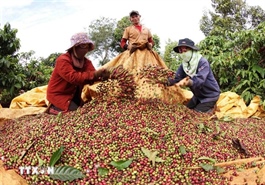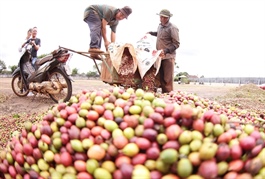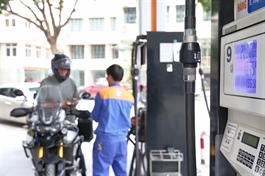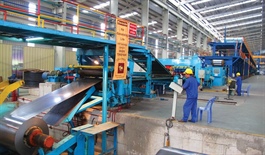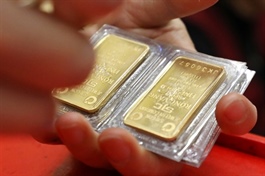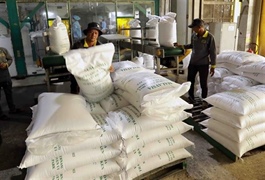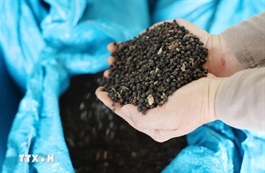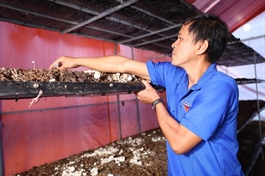Gold exchange should be a priority: economists
Gold exchange should be a priority: economists
Economists and industry insiders say setting up a gold exchange is now a priority for Việt Nam as the country seeks stronger tools to manage a market that affects exchange rates, inflation and financial stability.
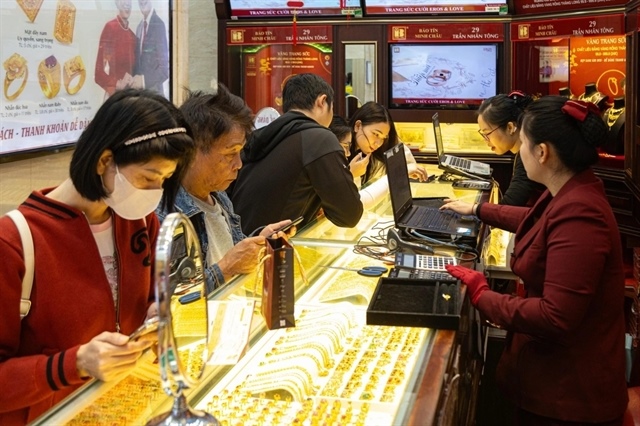
Customers at a gold shop in Hai Bà Trưng Ward, Hà Nội. VNA/VNS Photo |
Economic experts say establishing a gold exchange has become a priority for Việt Nam, as the country seeks stronger tools to manage a market that affects exchange rates, inflation and overall financial stability.
According to economic expert Ngô Trí Long, the question today is how it should be designed and operated. He said a well-structured and carefully managed exchange can give the State the information and tools needed to supervise the market effectively.
He said that a gold exchange would allow regulators to follow market movements in real time. They would be able to monitor buying and selling flows, identify risks, track price volatility and detect unusual trading patterns. With centralised data, the State can intervene when necessary by using market-based tools such as position limits, trading caps or risk-prevention measures. This approach would replace the previous reliance on administrative controls, which are no longer suitable in a fast-moving market.
He stressed that the focus should now be on how to design the exchange, what the implementation roadmap should be and how to ensure effective and transparent governance. If these elements are handled well, a gold exchange would help stabilise a market that often sees sharp swings, reduce speculation and bring domestic prices closer to global levels.
Vice Chairman of the Việt Nam Gold Trading Association Nguyễn Thế Hùng also agreed that a gold exchange is urgently needed. He said many gold-trading businesses still fail to meet basic technical and legal standards. Only around 30 to 40 per cent have invested properly in machinery, equipment and control procedures. The rest do not fully comply with regulations on input materials, storage conditions, quality standards and legal documentation. This lack of compliance has resulted in a market that is not transparent and is vulnerable to violations.
Hùng said that from both the business perspective and the Association’s viewpoint, Việt Nam now needs a clear, unified and transparent gold-market management mechanism. Such a system would not only deal with violations but also ensure national monetary security. He said the State Bank should soon establish a central management and coordination centre where all data, standards and regulations are consolidated. This would help the market operate in a stable and controlled manner.
He added that Việt Nam has the technology and infrastructure needed to develop a modern gold exchange, but it must be done step by step. The exchange should achieve three key goals: modernise trading activities, support State management by providing transparent data and create a basis for developing future financial products related to gold.
He said a long-term roadmap is needed. In phase one, the exchange should serve production and distribution. In phase two, distribution could expand to businesses with real demand. In phase three, gold-related derivatives could be introduced, but only after the legal framework and data system are complete.
Another important issue is how to bring household gold into the economy. Economist Nguyễn Trí Hiếu said the amount held by the public may reach several hundred tonnes. He said many people view gold as both a speculative asset and a form of financial insurance, especially in the absence of strong social or health safety nets. This is why gold has become a long-standing habit in Việt Nam.
However, keeping large amounts of gold at home is a major waste for the economy. Some estimates show that household gold reserves are equal to around eight per cent of GDP, yet they do not contribute to production or business activities.
BIDV Chief Economist Cấn Văn Lực said there is a need to clearly define which types of gold should be regulated. He said the State must continue strict management of gold bars and bullion, as they are used for investment and reserves and directly affect financial stability. Meanwhile, jewellery and handcrafted products are consumer goods with high processing value, so they should be regulated differently. Applying the same rules to both categories would be costly and unnecessary.
Lực also said Việt Nam should reassess the level of “goldisation” in the economy, determine how much gold households are storing and make data public and transparent. He added that gold-denominated lending and borrowing must be completely phased out to reduce system risks.
He said Việt Nam needs a transparent market and more attractive investment channels to guide people towards production and business instead of gold speculation. He added that action against gold smuggling must be strengthened and that Decree 232 should be fully implemented to increase legal supply.
- 08:04 19/11/2025







